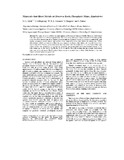Minerals that host metals at Dorowa Rock Phosphate Mine, Zimbabwe

View/
Date
2011Author
Meck, M.L.
Atlhopheng, J.
Masamba, W.R.L.
Ringrose, S.
Diskin, S.
Publisher
Bentham Open, http://www.benthamscience.com/open/tomj/index.htmRights
The article is licensed under the terms of the Creative Commons Attribution non-commercial LicenseType
Published ArticleMetadata
Show full item recordAbstract
This study set out to establish the major minerals at Dorowa and determine which of those are likely to host metals that may leach into surface and groundwater. This study comes after a preliminary assessment of the water quality in the Save River downstream of the Dorowa phosphate mine in Zimbabwe showed an increase in conductivity, iron content, manganese content, nitrates and hardness when compared to those taken before the mining area. X-Ray
Diffractometry (XRD) was used to establish the major minerals at Dorowa whilst Inductively Coupled Plasma Mass
Spectrometry (ICP- MS) was used to establish the chemistry of the rocks. The results from this study show that the major
minerals in the rocks around Dorowa are feldspars, pyroxenes, apatite, magnetite and calcite. The metals hosted by the rocks include Ag, As, Be, Cd, Co, Cu, Pb, Hg, Ni, Sb, Se and Zn. The study concludes that the minerals likely to host
metals are calcite and apatite. Metal hosting is higher in apatite minerals than in calcite. Metal hosting by the other minerals observed in the study area is low.
